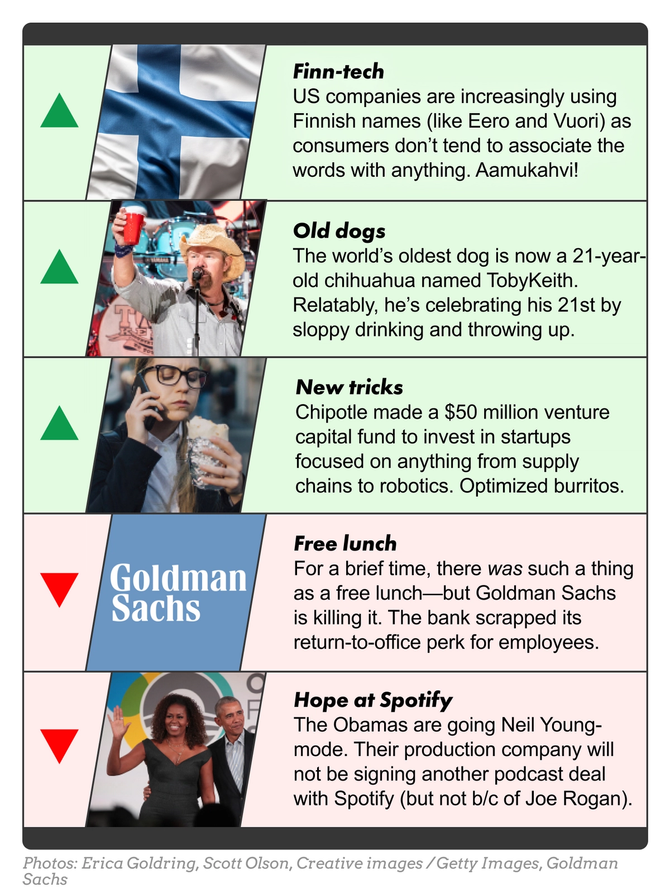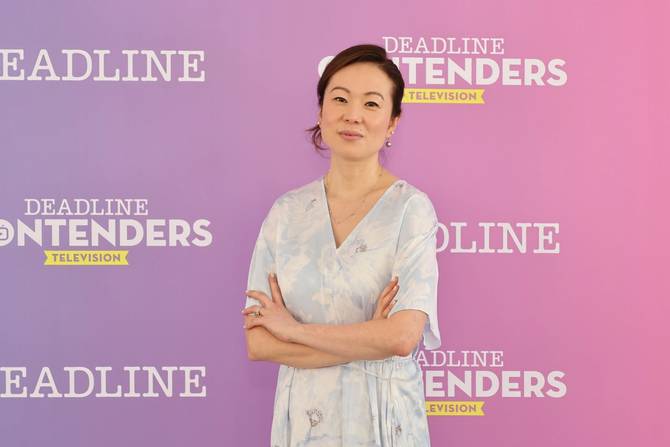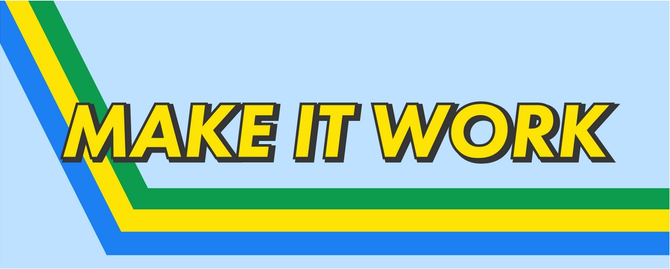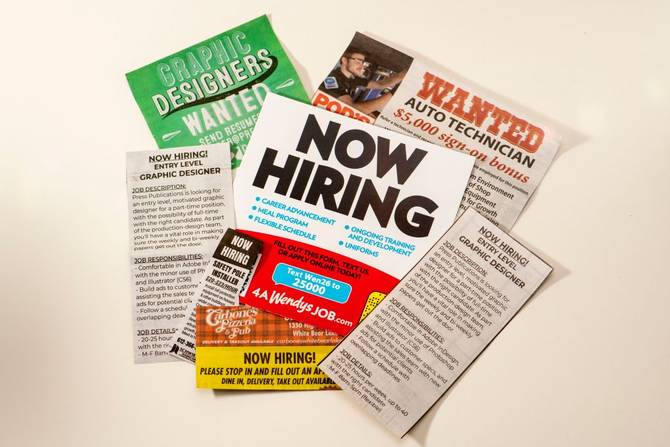| | | | | |  Joe Anderson | | IN THIS ISSUE | 'Pachinko' and the rise of international content | Crunch time for NYC's pay transparency law | Snag a piece of Omaha history | | | | Good morning. This week I spoke with a bunch of anxious college seniors who are preparing for life after school. The common themes: "Is life after college really that bad? They say college is the best four years of your life." "But I have no idea what I want to do with my career!" "It's so easy to make friends in college with clubs or sports. How do you make friends in the real world?" Having managed this transition and faced many of the same anxieties myself, here's what I can tell you: - Making friends as an adult does take a lot more effort, no doubt. To make it easier, you might want to expand your potential "candidate pool" of friends beyond what you might have considered in college, to include your coworkers, your neighbors, your friends' friends, members of the other political party.
- Not having homework is rad, but it also means you'll have more free time in the evenings and weekends. Make the most of that time by filling it with activities: social sports leagues, networking events in your industry, clubs or organizations related to your interests (yes, they exist in the real world), new hobbies, etc. Also a great way to make adult friends!
- When you work, you'll have a steady income, which you can use to buy things. That's pretty cool.
In the end, post-college life can be just as fun and even more fulfilling as campus life. The only thing I'm wondering is, does anyone have Taylor Swift commencement tickets? —Neal Freyman | | | | | | | | | Amy Sussman/Getty Images Pachinko, the TV adaptation of Min-Jin Lee's bestselling novel, airs its final episode on Apple TV+ this Friday. The multigenerational tale of a Korean family that immigrates to Japan during Japanese colonial rule broke the Tomatometer and made this Morning Brew writer cry, like, four times already. We spoke to Soo Hugh, Pachinko's showrunner, executive producer, writer, and creator, all about the show, as well as the increasing popularity of international content more broadly. Most of Pachinko's main cast is of Korean descent. How important to you was it that the cast was representational? I think you couldn't have done the show without that. You know, one of the things we say is that all Asians are not monoliths, right? So, like, I'm Korean. I'm not Japanese, I'm not Chinese. And someone who's Japanese is not Vietnamese, is not Korean. We're not interchangeable because we come from different experiences and different histories and pasts. I think it's important to try to represent the original character as much as possible. Characters in the show speak three languages. Did you originally write Pachinko in English, Korean, and Japanese? Definitely not, but I love that you even ask that question. I hope we fooled you. We wrote it in English, and then it was translated into Japanese and Korean through a very long, complicated process. Parasite director Bong Joon-ho famously spoke of overcoming "the 1-inch-tall barrier of subtitles" on stage at the Golden Globes in 2020. What's your opinion on, and approach to, subtitles? Having done Pachinko, my viewpoint has changed so much. What's so interesting is that you realize all around the world, they've been watching American content in subtitles for so long now. And now we're the ones being like, "Oh, maybe it's not so bad." I think we still have a lot of work to do. I still think we have to get over that perception in America and the West that subtitles are hard, or that those shows are hard. But just to see people even embrace a show like this…this would never have happened five years ago, never. And so I feel like we've taken a huge leap forward. Why do you think that greater acceptance of foreign content is happening now? I have to give a lot of credit to the streamers. When you have the freedom to choose whatever you want, and you don't have to pay $20 to go to the theater, right? So if there's no risk, "Let me try out this show in Spanish. Let me try out the show in Korean. And if I don't like it, I could just click away." All of a sudden it doesn't feel as stressful. And then once you get someone to click, you realize, "Wait a minute, this show's actually good." And for Netflix and for Apple to put as much foreign content as they do online…all of a sudden, it doesn't feel so marginalized anymore. P.S. Keep an eye out for Hugh's next project, White Darkness, an adaptation of David Grann's New Yorker article about an Antarctic expedition. This interview has been edited and condensed for clarity. | | | | | | The proverbial Tax-Man isn't the only one with superpowers these days. You'll unlock a few of your own once you learn about Opportunity Zone investing in this special investor guide from Caliber. Opportunity Zone investing can help you keep more of your capital gains and put them to work. You'll tap into some powerful benefits, including the ability to: - Defer paying your capital gains taxes until the end of 2026.
- Unlock compounding potential on your gains.
- Permanently escape taxation on post-investment gains.
To make full use of your new superpowers, you'll need to know all the qualifications and deadlines for Opportunity Zone investing. Get the deets here. | | | | Each week, our workplace whisperer Shane Loughnane answers a reader-submitted question about problems at work. Anything nagging at you? Ask Shane here. I got engaged recently and shared the news with some coworkers, including my boss. It mainly came up when people asked how my weekend had been, but I also wanted to be upfront about why I would be adjusting my work hours some days and, eventually, taking time off. My coworkers, particularly my boss, have been asking me regularly how wedding planning is going. I'm realizing that they might be assuming I'm inviting them to the wedding, but I'm not planning on inviting anyone from my workplace. Any advice on how to clear the air without offending anyone, especially my supervisor?—M. Something old, something new, something borrowed…Dennis from finance? You're right, it doesn't quite have the same ring to it. But before you start sending out those don't-save-the-date cards, let me offer my perspective as someone who has both attended a coworker's wedding and been left off the guest list for many others (a direct report included): Your colleagues are likely more indifferent than you think. And that's not to say they don't genuinely care about you or your wedding—their requests for updates are a testament to that—but I wouldn't rush to the conclusion that they're sizing up your room block and polishing their dance shoes. I don't think you need to clear the air here and, frankly, any attempt to do so might actually create an awkward situation where there wouldn't have otherwise been one. That said, it's smart to consider how you'd handle a more direct question or insinuation on their part, should it arise—as in, "We're actually keeping things pretty small, limiting our guest list to close family and friends, etc." The enduring pandemic, plus the fact that you're not inviting anyone from the workplace (as opposed to a select few), only deepens your absolution. It's your wedding, and you should feel free to invite whomever you want without any pressure from coworkers, your boss, or advice columnists. FWIW, you can send my invitation to the link below.  Share your workplace conundrum to Make It Work here. | | | Michael Siluk/Universal Images Group via Getty Images New York City's monumental pay transparency law is set to take effect on May 15, meaning that nearly every company operating in the city will have to include a pay range for all open job listings. Experts anticipate Slack messages with a jobs-board link and the  emoji to increase by around 900%. emoji to increase by around 900%. But a proposed amendment to the law—supported by large business groups and under consideration by the city council—could limit its scope, create room for loopholes, and delay its implementation until November. As the law stands, new rules would affect positions that are either remote or in-office, salaried or hourly, and at companies with four or more employees. The proposed amendment aims to make those transparency rules… More of a frosted-glass vibe The amendment was recently revised, but even minor alterations can have a major ripple effect on a law's potency. In the original wording of the amendment, businesses with 15 or fewer employees would be exempt—a change that would have removed around 58,000 NYC companies and 500,000 employees from the scope of the law. Critics of the amendment said these employees—including those in the food services and retail industries—are some of the city's most marginalized workers who are most in need of pay transparency. That's a big deal, as pay transparency laws exist largely to address racial and gender pay gaps. - And those gaps have actually gotten worse in NYC in recent years. The average woman in New York makes 86 cents for every dollar a man makes, down from 89 cents in 2015.
Businesses still have some issues with the transparency law, though. In a letter to the City Council, the Partnership for New York City (a powerful business group) criticized it for lacking input from the employers it would affect. Amid a labor shortage in the city, the group said the law could hurt employers' ability to meet diversity goals and adversely affect hiring. During testimony over the amendment, some small-business advocates also claimed the law would allow larger companies to easily outbid them for talented hires. But radical transparency has proven effective at addressing the wage gap and giving employees an idea of what their work is worth. A two-decade-long study of 100,000 academics found that universal access to pay information reduced the gender pay gap by up to 50%. While the law is still set to go into effect on May 15, the amended bill is currently in committee. Those trying to weaken the law may have their work cut out for them, though, as the original bill passed with a vote of 41–7.—MK | | | | | | Whatcha gonna do with all that equity comp? If you're not sure, you're not alone. Last year, $580 million worth of workers' vested, unexercised equity expired, and lack of education is largely to blame. Carta's free Equity 101 course will help you master equity fundamentals in an approachable, easy-to-understand way. Just ask the people they've partnered with, like Serena Williams and Tan France. Get your free resources today. | | | | Welcome to Open House, the only newsletter section that isn't interested in hearing your Nebraska slander.  Joe Braun, Chris Machian/Omaha World-Herald Joe Braun, Chris Machian/Omaha World-Herald Ahead of this year's annual pilgrimage to the Berkshire Hathaway shareholders meeting in Omaha, we're stopping by the birthplace of Warren Buffett's empire. Buffett rented this 3,300-square-foot home in the Dundee neighborhood in the 1950s for just $175 a month. Above the office door is Buffett's signature with the note, "The birthplace of Buffett Associates May 1956." Amenities include: - Yearly visits from Buffett stans who want selfies with the house
- Wrought-iron balcony overlooking the living room
- Wood-shake roof
- A home office with a lot to live up to
How much for a piece of business history when this home hits the market on April 26? | | | - Marriage moves to the metaverse. (Morning Brew)
- I lived the #VanLife. It wasn't pretty. (NYT Magazine)
- A truly wild rendition of The Simpsons theme song at Coachella. (Chad)
- On set with the Blockchain Bachelorette. (Vulture)
- Why Pebble failed. (Medium)
- My scream is famous. (The Guardian)
- On natural wine, inherited money, and the delusions of the "future-rich millennial." (Literary Hub)
- Two pieces on Elon Musk x Twitter: a UX theory (Built for Mars) and why Elon could unlock Twitter's vast potential (Stratechery).
- How Toy Story 2 was deleted twice, once by technology and again for its own good. (The Next Web)
- Why carmakers are going all-in on EVs. (Morning Brew)
| | | Welcome back to Morning Brew's Meme Competition, where we crown a single memelord every Sunday. Today's winner: Layla in Woodbury, MN  This week's challenge: You can find the new template here for next Sunday. Once you're done making your meme, submit it at this link for consideration. | | | In this episode of Street Value, we hit the streets of New York to find out which famous CEO people would trust with their future. Subscribe to our YouTube channel and leave us a comment on the video, and you'll be in the running to win $500. We'll pick three lucky winners on April 25. Watch now. *Terms and conditions apply. US entries only. | | | | |  | Written by Neal Freyman, Jamie Wilde, Matty Merritt, Max Knoblauch, and Shane Loughnane Was this email forwarded to you? Sign up here WANT MORE BREW? Industry news, with a sense of humor → - Emerging Tech Brew: AI, crypto, space, autonomous vehicles, and more
- HR Brew: analysis of the employee-employer relationship
- IT Brew: moving business forward; innovation analysis for the CTO, CIO & every IT pro in-between
- Marketing Brew: the buzziest happenings in marketing and advertising
- Retail Brew: retail trends from DTC to "buy now, pay later"
| ADVERTISE // CAREERS // SHOP // FAQ
Update your email preferences or unsubscribe here.
View our privacy policy here.
Copyright © 2022 Morning Brew. All rights reserved.
22 W 19th St, 4th Floor, New York, NY 10011 | | |















No comments:
Post a Comment